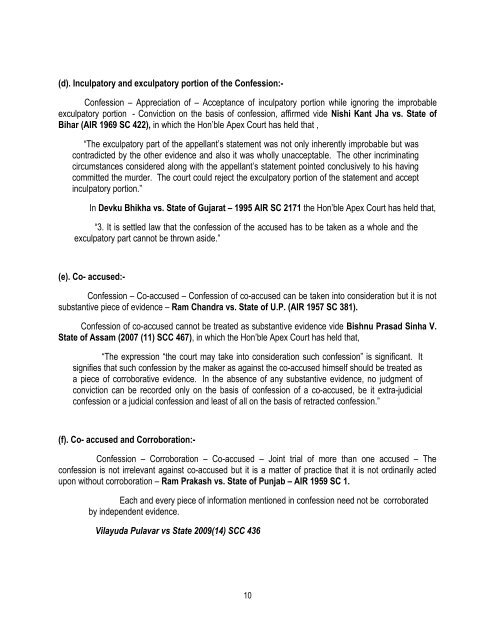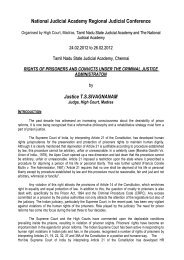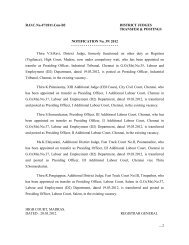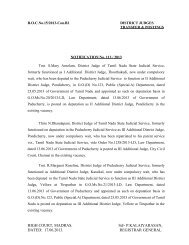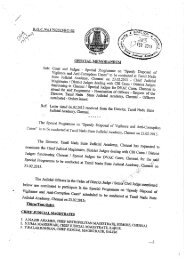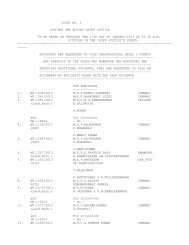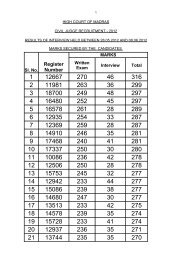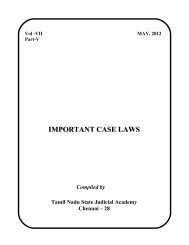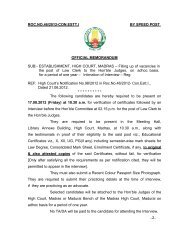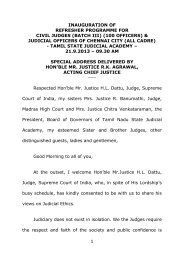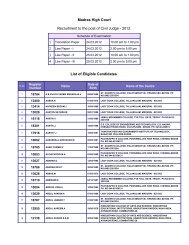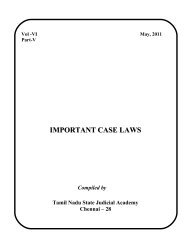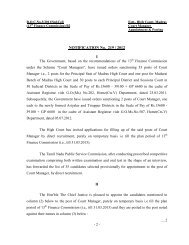Appreciation of Evidence in Sessions Cases - Justice D.Murugesan
Appreciation of Evidence in Sessions Cases - Justice D.Murugesan
Appreciation of Evidence in Sessions Cases - Justice D.Murugesan
Create successful ePaper yourself
Turn your PDF publications into a flip-book with our unique Google optimized e-Paper software.
(d). Inculpatory and exculpatory portion <strong>of</strong> the Confession:-<br />
Confession – <strong>Appreciation</strong> <strong>of</strong> – Acceptance <strong>of</strong> <strong>in</strong>culpatory portion while ignor<strong>in</strong>g the improbable<br />
exculpatory portion - Conviction on the basis <strong>of</strong> confession, affirmed vide Nishi Kant Jha vs. State <strong>of</strong><br />
Bihar (AIR 1969 SC 422), <strong>in</strong> which the Hon’ble Apex Court has held that ,<br />
“The exculpatory part <strong>of</strong> the appellant’s statement was not only <strong>in</strong>herently improbable but was<br />
contradicted by the other evidence and also it was wholly unacceptable. The other <strong>in</strong>crim<strong>in</strong>at<strong>in</strong>g<br />
circumstances considered along with the appellant’s statement po<strong>in</strong>ted conclusively to his hav<strong>in</strong>g<br />
committed the murder. The court could reject the exculpatory portion <strong>of</strong> the statement and accept<br />
<strong>in</strong>culpatory portion.”<br />
In Devku Bhikha vs. State <strong>of</strong> Gujarat – 1995 AIR SC 2171 the Hon’ble Apex Court has held that,<br />
“3. It is settled law that the confession <strong>of</strong> the accused has to be taken as a whole and the<br />
exculpatory part cannot be thrown aside.”<br />
(e). Co- accused:-<br />
Confession – Co-accused – Confession <strong>of</strong> co-accused can be taken <strong>in</strong>to consideration but it is not<br />
substantive piece <strong>of</strong> evidence – Ram Chandra vs. State <strong>of</strong> U.P. (AIR 1957 SC 381).<br />
Confession <strong>of</strong> co-accused cannot be treated as substantive evidence vide Bishnu Prasad S<strong>in</strong>ha V.<br />
State <strong>of</strong> Assam (2007 (11) SCC 467), <strong>in</strong> which the Hon’ble Apex Court has held that,<br />
“The expression “the court may take <strong>in</strong>to consideration such confession” is significant. It<br />
signifies that such confession by the maker as aga<strong>in</strong>st the co-accused himself should be treated as<br />
a piece <strong>of</strong> corroborative evidence. In the absence <strong>of</strong> any substantive evidence, no judgment <strong>of</strong><br />
conviction can be recorded only on the basis <strong>of</strong> confession <strong>of</strong> a co-accused, be it extra-judicial<br />
confession or a judicial confession and least <strong>of</strong> all on the basis <strong>of</strong> retracted confession.”<br />
(f). Co- accused and Corroboration:-<br />
Confession – Corroboration – Co-accused – Jo<strong>in</strong>t trial <strong>of</strong> more than one accused – The<br />
confession is not irrelevant aga<strong>in</strong>st co-accused but it is a matter <strong>of</strong> practice that it is not ord<strong>in</strong>arily acted<br />
upon without corroboration – Ram Prakash vs. State <strong>of</strong> Punjab – AIR 1959 SC 1.<br />
Each and every piece <strong>of</strong> <strong>in</strong>formation mentioned <strong>in</strong> confession need not be corroborated<br />
by <strong>in</strong>dependent evidence.<br />
Vilayuda Pulavar vs State 2009(14) SCC 436<br />
10


